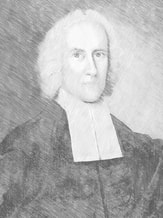Genesis 32
 Jonathan Edwards Files
Jonathan Edwards Files
An obvious pattern in the Bible is that God tests the faith and stamina of his people as they cry out in prayer for some significant mercy. He tests them by withholding the mercy they are asking for. Not only that, but first he makes things worse, sending them discouraging setbacks. But count on it – he will eventually prosper those who push through in urgent prayer without quitting and will not take no for an answer.
--Jonathan Edwards, “A Call to United Extraordinary Prayer,” in Works (Edinburgh, 1979), II:312.
--Jonathan Edwards, “A Call to United Extraordinary Prayer,” in Works (Edinburgh, 1979), II:312.
 Davide Feddes Files
Davide Feddes Files
If you think you may ask God for help only if you’ve earned the right, think again. God doesn’t help people who think they deserve it; he helps those who know they don’t deserve it. God is pleased and honored when we throw ourselves on his kindness and ask him for a lot more than we have any right to expect. Real prayer counts on God’s generosity and promises, not our qualifications.
Jacob confessed his unworthiness and begged God to save him and his family from destruction. All the while, Jacob kept reminding God of his promises to protect and bless him. Like a little child saying to his father, “You promised! You promised!” Jacob appealed to God’s promises again and again (32:9-12).
-Dr David Feddes; David Feddes. Originally broadcasted on the Back to God Hour and published in The Radio Pulpit
Jacob confessed his unworthiness and begged God to save him and his family from destruction. All the while, Jacob kept reminding God of his promises to protect and bless him. Like a little child saying to his father, “You promised! You promised!” Jacob appealed to God’s promises again and again (32:9-12).
-Dr David Feddes; David Feddes. Originally broadcasted on the Back to God Hour and published in The Radio Pulpit

Vs 26: What happens now? Jacob is just holding on; he's not wrestling. He is just holding on to this One. He found out that you do not get anywhere with God by struggling and resisting. The only way you get anywhere with Him is by yielding and just holding on to Him. Abraham had learned that, and and that is why he said amen to God. He believed God, and He counted it to him for righteousness. Abraham reached the end of his rope and put his arms around God. My friend, when you get in that condition, then you trust God. When you are willing to hold on, He is there ready to help you. --J Vernon McGee

Wrestling with God changed Jacob’s identity. He was no longer to be known as one who received his blessing by deception. This time he received God’s blessing by prevailing with God by faith. This struggle turned out to be a profoundly gracious gift of restoration that God gave Jacob, not unlike the gift Jesus gave Peter by letting Peter affirm his love for Jesus as many times as he had denied it (John 21:15–17). Jacob’s tenacious faith pleased God and he rewarded Jacob’s request (Hebrews 11:6). When God calls us to wrestle with him, there’s always more going on than we first understand and God always uses it to transform us for good.
When God makes us wrestle him for some blessing(s), it is not because God is reluctant to bless us, even if that’s how it first feels. It is because he has more blessings for us in the wrestling than without it.
Remember, God pursued Jacob for this match. God was the initiator. Jacob was stewing in his own anxiety over Esau and his approaching slaughter squad when God showed up. And the wrestling drew Jacob out of his fearful preoccupation and forced him to focus on God. -Desiring God
When God makes us wrestle him for some blessing(s), it is not because God is reluctant to bless us, even if that’s how it first feels. It is because he has more blessings for us in the wrestling than without it.
Remember, God pursued Jacob for this match. God was the initiator. Jacob was stewing in his own anxiety over Esau and his approaching slaughter squad when God showed up. And the wrestling drew Jacob out of his fearful preoccupation and forced him to focus on God. -Desiring God

Now; this is not talking about any kind of ‘name-it-and-claim-it’ theology. This isn’t meant to tell us that we can declare whatever ‘blessing’ we want and demand it. Rather, this is speaking of the things that God desires to do in our lives—the blessings He purposes to give us. In His wisdom and love, He doesn’t allow His intended blessings to be easy for us to grab hold of. Rather, He seems to have a way of making us wrestle for them—making us yearn for them, and almost have to grasp at them in such a way as to become broken in the process—and then made to grow more dependent upon Him—and finally matured into who He wants us to be.
This seems to be a way that He often works with those He blesses. He makes them wrestle for those blessings. -Bethany Bible |

God wants to bring each of us to that point where all our ordinary fears are swallowed up the by fear of the Lord and where all our ordinary desires are swallowed up in desire for God and his blessing. If you find yourself in a wrestling match with God, take the same attitude as Jacob. Tell yourself, “I cannot win, but I must not lose. I must not let go of God; I must have his blessing. I don’t know if I can live with him, but I know I can’t live without him. If he won’t bless me, he’s going to have to kill me, because I’m not going to let go of him.“ Jacob had no chance to overpower his opponent, but he still hung on for dear life. Like a little boy pinned under his big brother, helpless and hurt but stubborn as ever, Jacob wouldn’t give up or let go. He gasped, “I will not let you go unless you bless me.“ And he got the Lord’s blessing! -David Feddes; Back to God Hour
|

Jacob is ready for this fight. He has spent time in prayer, has renewed his confidence in God, and during the wrestling match, he stays strong, (I guess we would be too if we armed ourselves with the promises of God) He is, in fact so strong that the man (or something) strikes him on his hip socket and knocks it out of joint trying to weaken his resolve, but still Jacob won’t let go.
And Jacob says to Jacob “Let go already! Give up! Give in!” But Jacob grabs on even tighter- grits his teeth and says “No- not until you bless me!” And in that moment, Jacob, at least in my mind, acquires what it takes to be a Patriarch. Because when everything is on the line for him, instead of giving up and giving in… he doesn’t let go. He doesn't let go of the promises God made, or of the future God has planned, or the belief God has shown in choosing him- He will not give in to the Jacob who has won so many times in the past- not until he gets blessed, in other words, not until he can live without the inner voice once an for all, and begin living out everything God intends! And the opponent asks Jacob, “What is your name?” And he shouts out, 'Jacob!' But he is not just saying his name, he is stating everything he knows to be true about himself… the name, ‘Jacob,’ means, 'grabs at the heel,' 'supplanter,' 'trickster'… This is the identity he has lived with his whole life. Saying his name is for Jacob, an act of confession. Yes, this is who I am- but it is not who I will be any longer! And at once- he is free- free to be everything God has designed him to be. And his mirror opponent acknowledges defeat: "No- that is not who you are anymore. From now on your name is no longer Jacob- but Israel… " --Theology Stew |

Can we prevail against God in prayer? The wrestling with God is not about winning but receiving a blessing and it is about rolling in the dust, the lowest position we can adopt before God. The woman of Canaan who came to Lord Jesus for deliverance of her demon-possessed daughter, wrestled and received the blessing (Matthew 15:21-29). In answer to her plea for help, the answer from the Lord was ‘It is not good to take the children’s bread and throw it to the little dogs’. She immediately realized the correct interpretation of the word used by the Lord, ‘kunarion’ meaning ‘a little dog, a house dog’, a pet of the family. Expressing her agreement with the Lord, she rephrased her request, ‘yet even the little dogs eat the crumbs which fall from their master’s table’. Her faith was appreciated and her daughter was healed. God is love and His love towards mankind is revealed in His Son, the Savior who died for us (1 John 4:8).
Apostle Paul provides the answer to our efforts to get blessed, ‘He who did not spare His own Son, but delivered Him up for us all, how shall He not with Him also freely give us all things?’ (Romans 8:32). At the time of creation, God created everything that man would need and then blessed them to ‘be fruitful and multiply, fill the earth and subdue it; have dominion’ (Genesis 1:28). Man was created in God’s image and likeness but the serpent wanted Eve to have her own identity independent of God by eating of the forbidden fruit for then ‘your eyes will be opened and you will be like God, knowing good and evil’ (Genesis 3:5). Mankind’s identity is in knowing good and bad and not knowing about evil. The Hebrew word ‘yada’ used means ‘to know, be intimate with, cohabit, and comprehend’. The same word is used for Adam who ‘knew Eve his wife, and she conceived and bore Cain’ (Genesis 4:1). Thus the result of the sin of eating the forbidden fruit was about getting intimate with evil where the devil led mankind. From that moment the battle for personal identity started in mankind. -Sozo & Shalom 
The wrestling match is a more even fight than one might imagine. The man/angel/God strikes Jacobs hip, dislocating it, and still Jacob won’t let go. Finally, the being insists Jacob let go because it is morning. But Jacob still refuses: “Not until you bless me.” I don’t know what is more surprising in this passage, Jacob’s audacious tenacity as he continues to wrestle, despite the darkness and pain, or God’s willingness to bless Jacob after Jacob refuses to let go, after Jacob insists, “Not until you bless me.” --Jessica Hughes
|
 Quincy Brown
Quincy Brown
Facing our fears always brings us to the edge of the Jabbok: the emptying of ourselves, our identity, security, possessions, and positions. We each have our own Jabbok that we must cross alone. Jacob is alone and wrestles with God until daybreak. When God saw that Jacob would not give up, God dislocated Jacob’s hip and blessed him.
Jacob had to empty himself at the Jabbok and wrestle with God, and God didn’t seem to mind going to the mat with Jacob for several hours to bring him to his knees. And as hard as it is for me to admit, I wouldn’t say I like that God doesn’t mind wrestling with us and going to the mat to bring us to our knees. I wouldn’t say I like being pinned to the mat and having to surrender. I would much rather that God declares me the winner and blesses me without the struggle. That is, until I realize that “to wrestle” in Hebrew means “to get dusty and dirty.”
So, like Jacob, we wrestle with a God willing to “become dirty” to lift us out of the dirty messes of life that we create. During our muddy wrestling matches, we are blessed and wounded with a name change and a limp when daybreak comes. We see God face to face, and we receive a blessing.
Jacob’s name is no longer the deceiver, the heel-catcher. He is renamed and reborn. He is now Israel, who struggles with and prevails against God. We no longer must be independent agents, the GOAT (the Greatest Of All Time), Superman, or Wonder Woman, who endure through our strength. But we become Peniel, people who wrestle with God face to face and receive new life. Like Jacob, we cannot defeat God, but we can endure. We can stay in the struggle until a new day and receive the blessing. --Quincy Brown; Day 1; 8.6.23
Jacob had to empty himself at the Jabbok and wrestle with God, and God didn’t seem to mind going to the mat with Jacob for several hours to bring him to his knees. And as hard as it is for me to admit, I wouldn’t say I like that God doesn’t mind wrestling with us and going to the mat to bring us to our knees. I wouldn’t say I like being pinned to the mat and having to surrender. I would much rather that God declares me the winner and blesses me without the struggle. That is, until I realize that “to wrestle” in Hebrew means “to get dusty and dirty.”
So, like Jacob, we wrestle with a God willing to “become dirty” to lift us out of the dirty messes of life that we create. During our muddy wrestling matches, we are blessed and wounded with a name change and a limp when daybreak comes. We see God face to face, and we receive a blessing.
Jacob’s name is no longer the deceiver, the heel-catcher. He is renamed and reborn. He is now Israel, who struggles with and prevails against God. We no longer must be independent agents, the GOAT (the Greatest Of All Time), Superman, or Wonder Woman, who endure through our strength. But we become Peniel, people who wrestle with God face to face and receive new life. Like Jacob, we cannot defeat God, but we can endure. We can stay in the struggle until a new day and receive the blessing. --Quincy Brown; Day 1; 8.6.23
- When it comes to your life, your heart, your surrender and holiness before God you have to come to the place of being alone with Him. In that place there is no one else to depend on but Christ.
- Be desperate for God and His blessing. No other blessing matters more than that which comes from the gracious hand of God.
- When you are in that place of desperation for the true God, He WILL show up. If His blessings seem distant, ask yourself, “Have I been desperate for Him above all else?”
- God wants to bless you so He initiates the first move. When Jacob wrestled with God in Genesis 32 the Bible says, “The Man wrestled with Jacob”. God sought him out. He will seek you out too in order that you might find blessing in Him.
- The word wrestle in the Hebrew means to “get dusty”. In other words, if you desire God’s blessing you have to show up for business and have no intention of leaving till the job is done. No matter how messy or how “dirty” you get, stay there to you see more of Him and less of you.
- Expect brokenness in the process. Brokenness before a good and holy God will lead to proper mending and healing in the end. The scars formed from that time will serve to remind you of His faithfulness. Do not despise either the brokenness or the scars.
- There is only one purpose for finite man to wrestle with an infinitely wise and powerful God, and that is to prove that you are weak and He is strong. Until you realize this you will never receive the blessing you desperately need. Jacob’s “prevailing” was in his weakness. God’s strength is made perfect in your weakness.
- Those who “wrestle” with God in this life, those who fight the good fight, wrestle over truth and against sin’s grip, are the ones living with fruitfulness unto God. Simply put – to not wrestle is to lose.
- If you’re not wrestling with God then you’ll end up wrestling with yourself or others, and there is no blessing there. Even in your dealing with this world, you must look to God alone for blessing, approval and heart change.
- Jacob said “I will not let you go unless you bless me.” The day had broken and the match was over. It was clear that the “Man” was stronger. But Jacob was not willing to let Him go till he received from the Greater. In your situation of needing God, don’t let go till you admit that He is stronger. Only then will you be strengthened too.
- Wrestling with God requires admitting your faults. Be willing to admit who you are without Him. The Man asked Jacob “What is your name?” to which he answered, “I am Jacob”, a.k.a. deceiver and heel grabber. It can be humiliating to admit human frailty and sinfulness, but this humility leads to God’s blessing.
- Upon admittance and repentance with humility towards God, He will change you by His Spirit and make you a new person. He will change you and bless you where blessing is needed most. There is much blessing in your willingness to be “governed by God”. --Joel Littlefield


